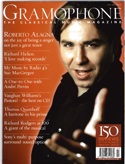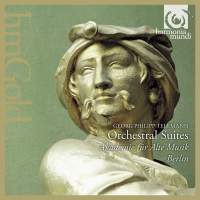Texte paru dans: / Appeared in:
|
|
|
Telemann at his most light-hearted played with plenty of appropriate energy
More entrancing
Telemann suites - how the man kept them coming I just do not know. Here we have
La Bizarre, rather excitedly named after some textural oddities in the
overture; a trumpet suite with no title but including an amusing depiction of a
postillion; and Les Nations, a whizz through the national characteristics
by turns of the Turks (coarse and direct), the Swiss (calm and dignified), the
Muscovites (represented by their church bells) and the Portuguese (exuberant
dancing). This particular suite also ends with a pair of movements depicting
horses fast and slow - Telemann certainly liked to let his imagination range
freely' Finally, there is a violin concerto which seems to be a tongue-in-cheek
imitation of Vivaldi imitating frogs (Les Rainettes), creatures which
readily lend themselves to dissonant string impersonation. In short, this is
music of unremitting good humour, with plenty of jokes for musicians and
listeners alike, in which the ideas never stop flowing and the craftsmanship
never falters. How like Haydn Telemann can be! The Berlin Academy of Early Music
could have been made for these works. All it takes to bring them off, after all,
is to play with Tiggerish energy, virtuoso precision of ensemble and a huge
smile in your heart, and this they do with a group spirit that is all the more
remarkable for the fact that they operate without a director. True, they may
lack some of the clarity and grace shown by Collegium Musicum 90 under Simon
Standage in their account of Les Nations on Chandos, but their strength
of commitment more man compensates . This, one senses, is a group in which every
member is prepared to live the music to the full, and the result is a joy from
start to finish .
Only one of the works here is at all well known. That is the Alster Suite with its occasional onomatopoeic content. It's a well-sustained piece yet not, perhaps, in the end one of Telemannís most musically satisfying ones . I have a sneaking sympathy for his Hamburg contemporary , Mattheson, who disliked the composer's predilection for imitating the sounds of nature. For my ears, at least , the elegantly proportioned and modestly scored Suite in G minor, La Musette, is more beguiling and of greater enduring appeal. Its 'Polonaise' is vintage stuff, as are the 'Musette' from which the Suite takes its name, and the central European-inspired 'Mourky'.
Performances
are full of atmosphere and sensible to the myriad of expressive niceties which
make Telemanní's style exhilarating and touching, in turn. But there are patches
of rough oboe playing in the AIster Suite which mar an otherwise
agreeable performance. That apart, the release is warmly commended. More than
half the programme appears on disc for the first time, so ardent Telemann
collectors will be able to extend their repertoire. Fine recorded sound. |
|
|
|
|
|
Cliquez l'un ou l'autre
bouton pour dťcouvrir bien d'autres critiques de CD |
|





